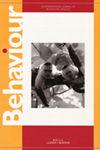In female degus, reunions are less variable when relationships are new
IF 1
4区 生物学
Q4 BEHAVIORAL SCIENCES
引用次数: 0
Abstract
Abstract When establishing new peer relationships, animals may explore different modes of interaction, testing-out dominance roles, reciprocation of affiliation, and responses to investigation. This exploration is potentially risky, as higher variability may be counterproductive to establishing expectations and trust. There is therefore a tradeoff between exploration within a new social relationship and maintaining predictable, ‘safe’ behaviours, raising questions about how animals differ in how they engage with strangers. The Chilean degu offers an opportune case study to investigate novel social situations, as females form relationships relatively rapidly with unrelated peers. We presented degu dyads with a series of 20 min ‘reunion’ sessions and found that session-to-session variability in stranger females is, in fact, lower than in cagemates, and lower than stranger or cagemate males. Reduced variability was observed only after an initial social exposure, suggesting it was a feature of new relationships rather than novelty. There was no evidence that groups differed in predictability of behaviours within a reunion. It is known that in the wild, female degus differ from males by readily forming cooperative relationships with unrelated individuals. The data therefore raise the possibility that animals predisposed to cooperation might also show reduced behavioural variability across encounters with new individuals. This work offers new results and methods for considering strategies animals use to cope with social uncertainty.在女性家庭中,当关系是新的时候,团聚的变数就会小一些
在建立新的同伴关系时,动物可能会探索不同的互动模式,测试优势角色、隶属关系的回报和对调查的反应。这种探索具有潜在的风险,因为较高的可变性可能会对建立期望和信任产生反效果。因此,在新的社会关系中进行探索和保持可预测的“安全”行为之间存在权衡,这引发了关于动物与陌生人交往方式有何不同的问题。智利的德古犬为研究新的社会状况提供了一个很好的研究案例,因为雌性与不相关的同伴建立关系相对较快。我们用一系列20分钟的“重聚”环节来呈现雌雄同体,并发现,事实上,陌生的雌性比关在笼子里的雄性更低,也比陌生的或关在笼子里的雄性更低。只有在最初的社会接触之后才会观察到变异性的减少,这表明这是新关系的特征,而不是新鲜感。没有证据表明群体在聚会中行为的可预测性上存在差异。众所周知,在野生环境中,雌degu与雄degu的不同之处在于,它们很容易与不相关的个体建立合作关系。因此,这些数据提出了一种可能性,即倾向于合作的动物在遇到新个体时也可能表现出较少的行为变异性。这项工作为考虑动物用来应对社会不确定性的策略提供了新的结果和方法。
本文章由计算机程序翻译,如有差异,请以英文原文为准。
求助全文
约1分钟内获得全文
求助全文
来源期刊

Behaviour
生物-动物学
CiteScore
1.80
自引率
7.70%
发文量
44
审稿时长
3 months
期刊介绍:
Behaviour is interested in all aspects of animal (including human) behaviour, from ecology and physiology to learning, cognition, and neuroscience. Evolutionary approaches, which concern themselves with the advantages of behaviour or capacities for the organism and its reproduction, receive much attention both at a theoretical level and as it relates to specific behavior.
 求助内容:
求助内容: 应助结果提醒方式:
应助结果提醒方式:


